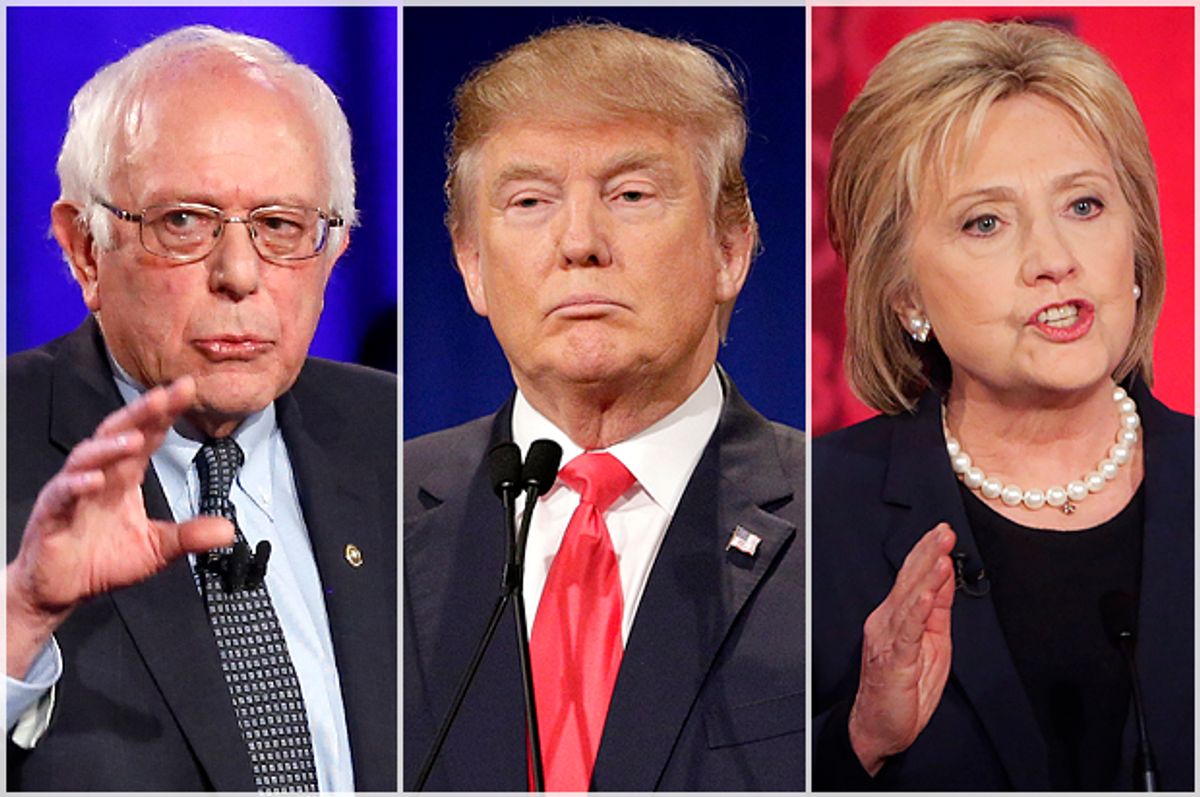Last month was recorded as the warmest January in history according to two analyses by NASA.
Climate change, now a widely accepted condition, means that the current and future governments of the world will have to take into account a drastically altering natural landscape, and shape their policies around how we can ensure a livable and healthy planet for future generations. The next president will greatly define the course the world will take in either pushing back or stepping forward the solutions of environmental concerns. Even as the Supreme Court recently attempted to stall the White House Clean Power Plan, polls show that the environment is one of the most important priorities for the U.S electorate.
So we’ve summed up the top candidates’ stances on renewable energy and their efforts so far.
Starting off with the worst:
Sen. Ted Cruz: ranked the No. 1 recipient of oil and gas donors in 2016 on OpenSecrets, he famously said that the Obama administration “Waged A War” on oil, gas, and the coal industries. Instead of focusing on renewables, the senator thinks the U.S should pursue every type of energy. “We’ve got to stop this business of selecting one group, that’s the left’s trick – they want to buy everyone off. I think we should abolish all of the energy preferences across the board, and allow competition to play out.”
- Opposed production tax credit for wind energy.
- Voted against legislation that would set national goal of 25% renewable energy by 2025.
- Voted against installing solar panels on ten million roofs in 10 Years by 2025.
Sen. Rubio: ranked 6th (just under Hillary Clinton) on the top recipients of oil and gas donors in 2016, Rubio claims America is at a global disadvantage because it’s currently not allowed to export oil. If elected president, Rubio plans on deregulating the oil and gas drilling process, especially the federal regulations on fracking. “The Bureau of Land management’s costly, misguided, and illegal hydraulic fracturing rule, undermines state regulators and does not produce any additional environmental or public health benefit.”
- Vows to remove five-year offshore drilling ban and immediately increase frequency and expedite exports.
- Has promised to “break the higher education cartel,” and help put graduates on career path in oil and gas.
- Did not vote on legislation that would set national goal of 25% renewable energy by 2025.
- Did not support the installation of solar panels on ten million roofs in 10 years.
Hillary Clinton: ranked 5th on the top recipients of oil and gas donors in 2016, Clinton has used her words more prolifically than her actions in the fight for green energy. When asked about taking oil money in the Feb. 4, Democratic primary debate Clinton said, “They must have put it in the wrong envelope. I want to take away all their subsidies.” She has affirmed a definite ban of oil and gas extraction on public lands. On the other hand, a pro-Clinton super PAC champions the secretary for channeling the domestic energy boom “into a geopolitical tool to advance American interests around the world.” Clinton’s “Climate Change Fact Sheet” commits to reducing oil consumption, but has no mention of the same efforts for natural gas.
- Vows to generate enough renewable energy to power every home in America within ten years.
- Has rallied for 500 Million solar panels in the next 4 years.
- Promised to build on Obama's Clean Power Plan, vowing to treat it as the "floor, not the ceiling."
Donald Trump: the real estate magnate has been vocal on every other issue, but renewable energy. Nonetheless, it is safe to assume that the Donald is not a great fan of wind turbines. In April 2012, Trump urged Scotland’s parliament to end plans for an offshore wind farm he feared would spoil the view at his exclusive $1.2-billion golf resort. He also reemphasized his hatred for wind during a November 2015 campaign stop in New Hampshire, when he said to a 12-year-old girl, “windmills look nice, but they kill a lot of birds. Did you know that?”
- Has called for a “No cap-and-tax on oil,” labelling it as the “country's lifeblood.”
- Stated green energy is "way behind the times" and that solar panels are a 32-year payback.
- Hasn't taken a stance on climate change but did once joke that “China created climate change.”
Sen. Sanders: undoubtedly the most vocal on climate change; in January 2016 the senator expressed the need for us to “act immediately” and move to “100 percent renewable energy.” On November 4, 2015, Sanders, along with senators Jeff Merkley and Patrick Leahy, introduced legislation to ban “all new federal leases for oil, gas or coal extraction on public lands and waters.” According to a fact sheet released by his campaign “the bill would prohibit offshore drilling in the Arctic and the Atlantic; stop new leases and end non-producing leases for offshore drilling, in the Pacific and Gulf of Mexico.” The Vermont senator has also supported Pope Francis’ view on climate change, “I believe, and Pope Francis made this point – this is a moral issue. The scientists are telling us that we need to move extremely boldly."
- Introduced first piece of climate change legislation in 2013 with Senator Barbara Boxer that called for a tax on carbon.
- In January 2015, he voted for legislation that would set a goal for the nation to get 25% of its electricity from renewable sources.
- Voted To Advance To Legislation Extending Production Tax Credit For Wind Energy
- Voted in support of ten million solar panels in ten years by 2025.

Shares